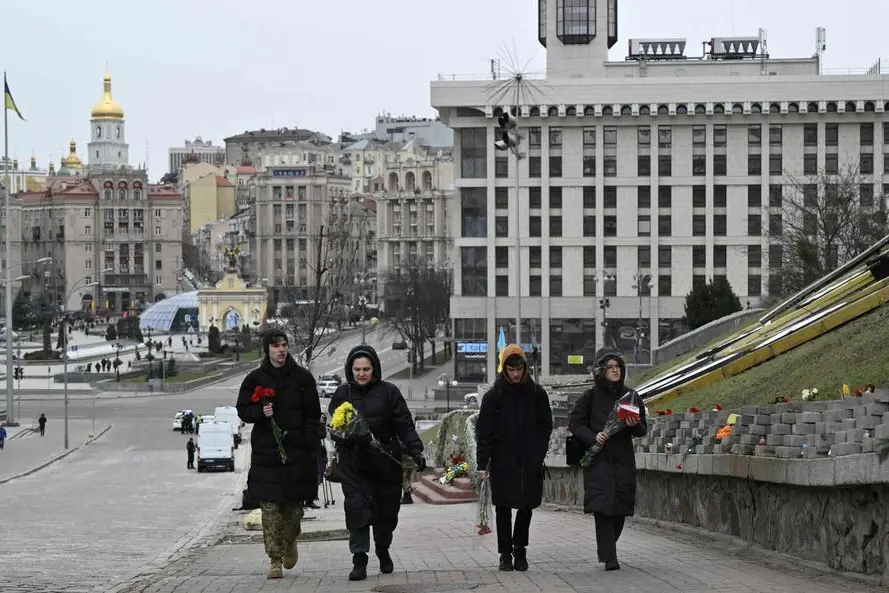PHOTO
Oleksandr still has grainy pictures on his phone from those chaotic months in Ukraine 10 years ago, when he was still an artist with pacifist ideals.
They show him on Maidan square in Kyiv, amid blazing tires and black smoke, with crowds of protesters clashing with armed riot police and demanding deeper integration with Europe.
The rallies changed his country and ultimately his life: a decade later, he is fighting off Russia's invasion in east Ukraine -- the bloodiest war in Europe since World War II.
For many now on the front, like the 45-year-old senior combat medic, the battle for Ukraine's survival began in 2013, when its leader tore up EU integration accords, sparking the rallies.
"It started when the riot police beat the students. It started when the agreement wasn't signed," said Oleksandr, who joined the army shortly after.
"There, under the bullets, it all started," he told AFP, an assault rifle resting on his knee, looking over plains leading to Russian positions in east Ukraine.
- 'Good and evil' -
Thousands of Ukrainians joined the nationwide pro-democracy protests sparked in the winter of 2013 after then-president Viktor Yanukovych scrapped EU integration to cement ties with the Kremlin.
The protests led to his ouster, and separatists leveraged the upheavals and seized towns in the industrial east with Russia's help. Moscow also annexed the Crimean peninsula to a muted reaction from the West.
On the 10-year anniversary of the killing of 100 Maidan protesters this month, President Volodymyr Zelensky also drew a direct line between the protests and Russia's invasion.
"Ten years later, attempts to destroy us and our independence continue. There were bullets against the unarmed Heavenly Hundred. Now it is missiles, drones and armies."
Much changed in those years.
The man credited with rallying the pro-Kremlin separatists in eastern Ukraine, nationalist Igor Girkin, was jailed in Moscow for his fierce criticism of Russia's invasion strategies.
Ukraine is now on the path to EU membership.
The fighting in 2014 -- once framed as a local conflict -- is now a battle between "good and evil", Zelensky has said. For Russian leader Vladimir Putin, it is a war between Russia and the West.
But for ordinary Ukrainian servicemen on the front for the last decade -- some of whom were also on Maidan -- the goals and high stakes are the same.
- 'Missiles flying everywhere' -
Oleg Lukashenko, a 49-year-old senior sergeant, who has also been serving for a decade, said the main difference now is that the war arrived at more Ukrainians' doorsteps.
"Missiles are flying everywhere, and everyone has understood that this is a war, and that it will reach everyone, and that if you do not stand up to defend your country, it can come to every corner of Ukraine," he said.
Another combat medic, 37-year-old Oleksandr, who has also been fighting in east Ukraine for 10 years, described the first day of Russia's full-scale invasion in February 2022 as "almost a normal day".
"I wouldn't say the war started in 2022. I've been burying my friends since 2014," he told AFP.
Dotted across east Ukraine are stark reminders of the chaotic fighting that broke out in the wake of the Maidan rallies that claimed his friends' lives.
At crossroads, leafy lay-bys and hilltops stand stone memorials bearing the names, ages and rank of Ukrainian servicemen killed by rebels and Russian forces in 2014.
The country lost an estimated 4,400 troops before the full-scale invasion in 2022, in fighting that cost more than 14,000 lives in total, according to the United Nations.
And fighting placed immense pressure and uncertainty on the civilians caught in the crossfire.
- 'No one' lives long in war -
Olga Yudakova, a 61-year-old psychologist in Kramatorsk -- one of the towns briefly captured by separatists -- has been working with children to relieve stress of the invasion.
She recounted how anxiety already took hold a long time ago, and how parents calmed children afraid of explosions by telling them the blasts were echoing from nearby metal factories.
"Unfortunately, the children suffered a lot. After 2014 it was very noticeable, there were a lot of scared children," she said.
The soldiers interviewed by AFP all described Ukraine as a country transformed and more united by the decade of political upheaval and conflict.
Some reflected on how they had changed too, and voiced uncertainty they would live to see another 10 years.
In his past life, the 45-year-old combat medic Oleksandr was a decorative painter opposed to violence, a "hippie". Maidan, then the war, changed that.
Where will he be in another decade?
"No one lives 20 years in war. There are two types of fighters. Brave and old."





















